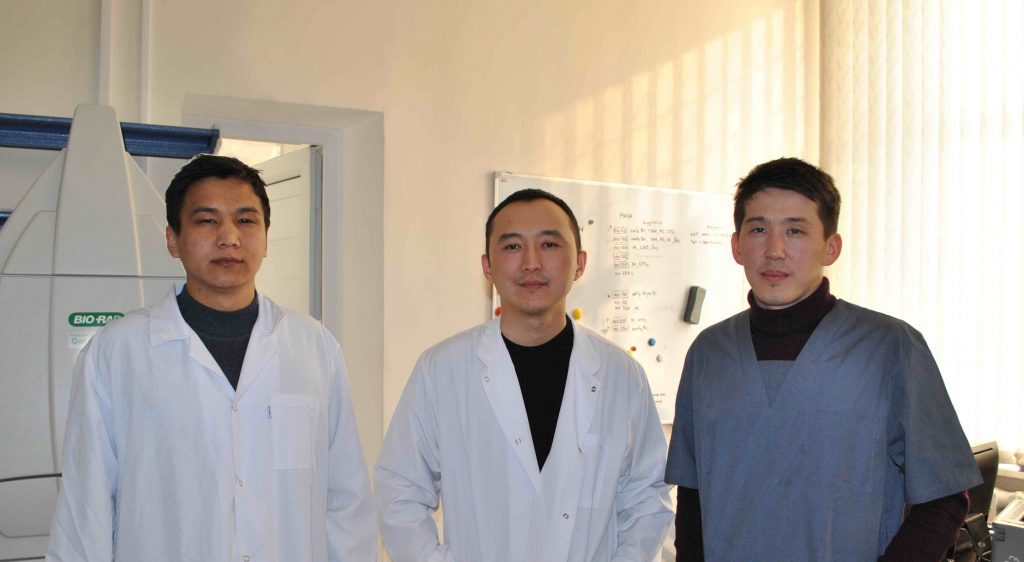Ashirbekov Eldar Erlanovich
Eldar Ashirbekov graduated from M. Kozybaev North-Kazakhstan State University. He is a specialist in the field of molecular genetics and an author of more than 30 publications. He has more than 14 years of work experience in science.
The main directions of research activities
- Ethnogeography and ethnogenomic studies of population of Kazakhstan;
- Paleogenomic studies of DNA from the biological material of archaeological excavations;
- Analysis of genetic diversity and certification of plant and animal populations, strains of microorganisms;
- Study of the effect of low doses of radiation on human DNA.
Research projects
2022 – 2024
АР13068414 “MicroRNA as a marker of differential diagnosis of lung cancer and tuberculosis”, scientific supervisor – G. Utegenova, PhD student.
2019-2022
Project AP08857430 “Identification of a new minimally invasive biomarker for the diagnosis and prognosis of diabetic retinopathy based on microRNA”, scientific supervisor – K. Sharipov, doctor of biological sciences, professor.
2018-2020
AP05132207 “Study of the correlation of miRNA with target genes and the level of their expression in oncopathologies”, scientific supervisor – N. Aitkhozhina, doctor of biological sciences, professor, Academician of the National Academy of Sciences of the Republic of Kazakhstan.
GF4/4050 project “Molecular genetic characteristics of the Kazakhs of South Kazakhstan, Zhambyl and Almaty regions based on single nucleotide and microsatellite variability of the Y-chromosome”, scientific supervisor – N. Aitkhozhina, doctor of biological sciences, professor, academician of the National Academy of Sciences of the Republic of Kazakhstan.
2012-2014
GF 0226 project “Molecular genetic study of the ethnogenetic polymorphism of the Y-chromosome of modern kazakhs and ancient people of the Desht-i-Kipchak region”, scientific supervisor – T. Balmukhanov, doctor of biological sciences.
NTP: O.0592 “Development of domestic genomic-proteomic and cellular technologies for the needs of medicine, agriculture and environmental protection in Kazakhstan”, scientific supervisor – T. Balmukhanov, doctor of biological sciences.
2009-2011
PFI: F.0479 “Regularities of functioning of biological systems – the basis for the creation of innovative technologies for medicine, agriculture and environmental protection”, scientific supervisors – T. Balmukhanov, doctor of biological sciences, N. Aitkhozhina, doctor of biological sciences, professor, academician of the National Academy of Sciences of the Republic of Kazakhstan.
2008-2010
NTP: О.0457 “Maintenance and replenishment of collections of plants, animals, microorganisms and unique genetic banks for the conservation of the biological diversity of Kazakhstan”, scientific supervisors – T. Balmukhanov, doctor of biological sciences.
Methods of research
Scientific achievements of the Laboratory
- The foundations of human molecular and population genetics, gene diagnostics were laid for the first time in Kazakhstan.
- Determination of features of the structural and functional organization of some genes involved in the development of cardiovascular (myocardial infarction, coronary heart disease, hypertension, atherosclerosis), neurodegenerative (multiple sclerosis) and oncological (breast cancer, cancer of the uterine body) diseases in the Kazakh population.
- The Kazakhs tribal structure based on the distribution of haplogroups and microsatellite variability of the Y-chromosome was studied, the analysis of intergeneric genetic linkage was carried out, the contribution of the Eurasian lines to the Kazakh gene pool was assessed, the age of the Kazakh lines was assessed, and the genetic component in the zhuz organization was assessed.
- The polymorphism and divergence of genomic DNA of mountain sheep of the Ovis genus, a number of medicinal and rare plants of Kazakhstan, and strains of economically valuable microorganisms were studied.

